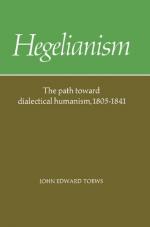|
This section contains 3,735 words (approx. 13 pages at 300 words per page) |

|
The term Hegelianism is applied to a range of philosophical doctrines and traditions influenced by the nineteenth century German philosopher Georg Wilhelm Friedrich Hegel (1770–1831). Hegel's influence is as broad and diverse as his writings; moreover his legacy, like his philosophy, is characterized by tensions between dialectical opposites.
A central part of Hegel's philosophical reputation has always been in metaphysics, where he is seen as the leading proponent of absolute idealism: the thesis that reality as a whole—nature, humanity, history, and so on—is informed and shaped by (and indeed ultimately is a manifestation of) what Hegel famously called Geist: mind or spirit. For Hegel, Geist is both rational and rationally comprehensible, whether in logical structure, natural science, or historical progress. Hegel also held that Geist itself exhibits a distinctive self-consciousness or self-articulation, and that the manifestations of this self-consciousness can be found in psychology, history, religion, drama...
|
This section contains 3,735 words (approx. 13 pages at 300 words per page) |

|


